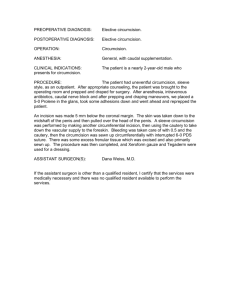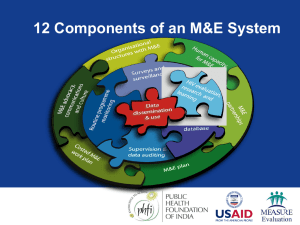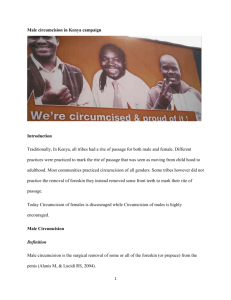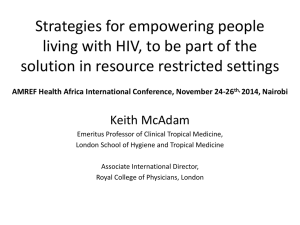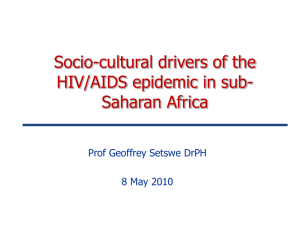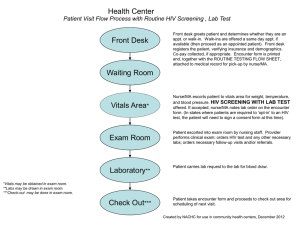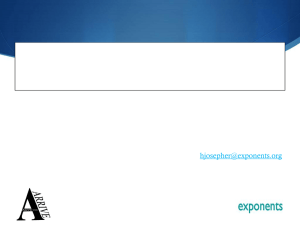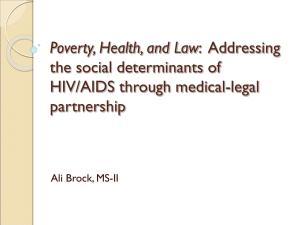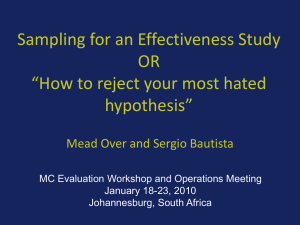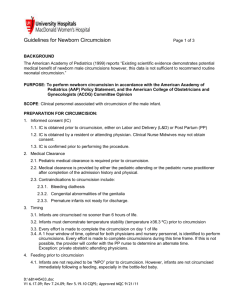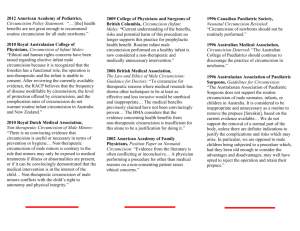Summarizing Male Circumcision Efficacy
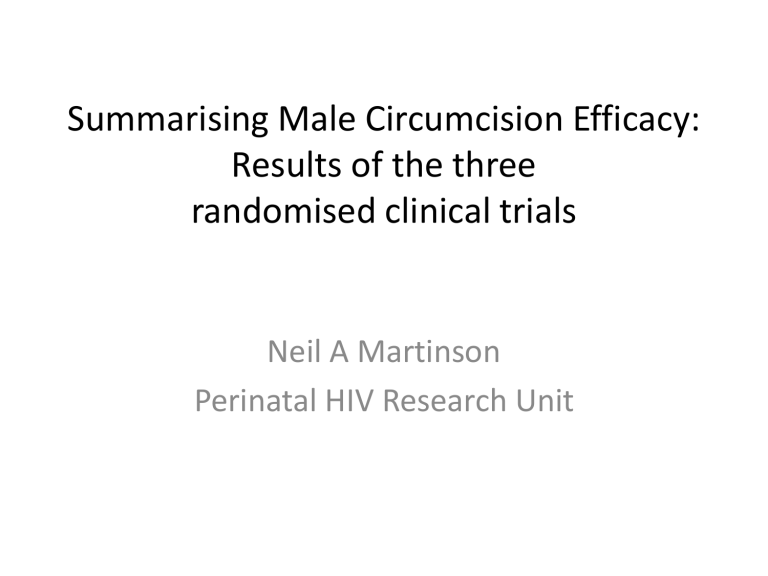
Summarising Male Circumcision Efficacy:
Results of the three randomised clinical trials
Neil A Martinson
Perinatal HIV Research Unit
Three Randomised Control Trials of
Male Circumcision
• Orange Farm – South Africa Nov 2005
• Kisumu – Kenya Feb 2007
• Rakai – Uganda Feb 2007
Today: Feb 2010
Efficacy
• How well an intervention works when studied in under rigorous conditions of a RCT.
• Percentage reduction in disease events by providing the intervention.
• Control group/arm– no circumcision
• Intervention group/arm- circumcision
(but in all other respects groups are v. v. similar)
Conditions of a trial
• Well funded
• Excellent staff – trained and supervised
• Adverse events reported immediately
• Monitors – oversee every aspect of the trial
• Participants in trial
≠
general population
• Numerous: visits, samples, questions
• No visit – immediately triggers retrieval
• More attention than real life (safe sex).
Answers of a trial
Under “ideal” conditions
• Is circumcision better than not circumcising?
• If better, by how much?
• Is it safe?
Trial jargon
• Male circumcision – removal of virtually all penile foreskin by a trained health worker using sterile surgical techniques.
• Randomisation: Subjects allocated to intervention or control group by chance (but in equal numbers).
• HIV acquisition: becoming infected with HIV
• Adverse event: unwanted side effect of intervention
The three studies: design
HIV negative men
Randomised
Circ
Follow up 6 mo
Follow up 12 mo
Follow up 12 mo
Final HIV Assessment @
24 mo
No circ
Follow up 6 mo
Follow up 12 mo
Follow up 18 mo
Final HIV Assessment @
24 mo
Circ
Results 1: Orange Farm
Overall efficacy of male circumcision in preventing HIV acquisition by young men: 60%
3.6% had an adverse event related to circ
Auvert et al PLoS Medicine 2005
Time
0-6 months
6-12
12-24
ALL
Results 2: Rakai - Uganda
Overall efficacy of male circumcision in preventing HIV acquisition: 55%
Circ group
1.2%
0.4%
0.3%
0.7%
8% had adverse event related to circ.
Uncirc group
1.6%
1.2%
1.2%
1.3%
Gray et al Lancet 2007
Results 3: Kisumu - Kenya
Overall efficacy of male circumcision in preventing HIV acquisition: 53%
Time interval Circ group
0-6 months 0.8%
6-12
12-18
0.2%
0%
18-24
ALL
1%
2.1%
1.7% adverse events related to circ
Uncirc group
1%
1.4%
0.7%
1.2%
4.2%
Combining all 3
“
The results indicate compelling evidence that male circumcision, when conducted using a medical procedure, reduces the acquisition of HIV by heterosexual men by
between 38% and 66% over 24 months.
Incidence of adverse events is very low, indicating that male circumcision, when conducted under these conditions, is a
safe procedure. “
Siegfried N et al Cochrane Database 2009
Benefits restricted to men!
• A trial of circumcising HIV-infected men showed no reduction in HIV acquisition by female partners of circumcised men.
• Those who resumed sex early were at higher risk of acquiring HIV from their male partner.
Wawer M et al Lancet 2009
What else is there to prevent HIV?
• Behaviour changes (ABC)
– Condom use
– Reduce concurrent partners
– Delay sexual debut
• Vaginal Microbicides
• Barriers (condoms and diaphragms)
• Vaccines
• Pre exposure prophylaxis
• Treatment as prevention
Thank you for your attention
ALVAC®-HIV (vCP1521)
• Recombinant canarypox vector vaccine genetically engineered to express HIV-1 gp120 (subtype E:
92TH023) linked to the transmembrane anchoring portion of gp41 (subtype B: LAI), and HIV-1 gag and protease (subtype B: LAI) .
AIDSVAX® B / E
• Bivalent HIV gp120 envelope glycoprotein vaccine containing a subtype E envelope from the HIV-1 strain
CM244 and a subtype B envelope from the HIV-1 strain
MN .
HIV Vaccine
Acquisition Endpoint: Modified Intent-to-Treat (mITT)
1.0
.96
Placebo
0.9
.84
0.8
.68
0.7
.64
Vaccine
.58
0.6
0.5
.41
.38
0.4
0.3
0.2
.15
0.1
Placebo
Vaccine
0.0
0.0
0.5
1.0
1.5
2.0
2.5
3.0
3.5
YEARS
Vaccine infections: 51
Placebo infections: 74 p = 0.04
Efficacy: 31.2%
95% CI (OBF): 1.1, 51.2
